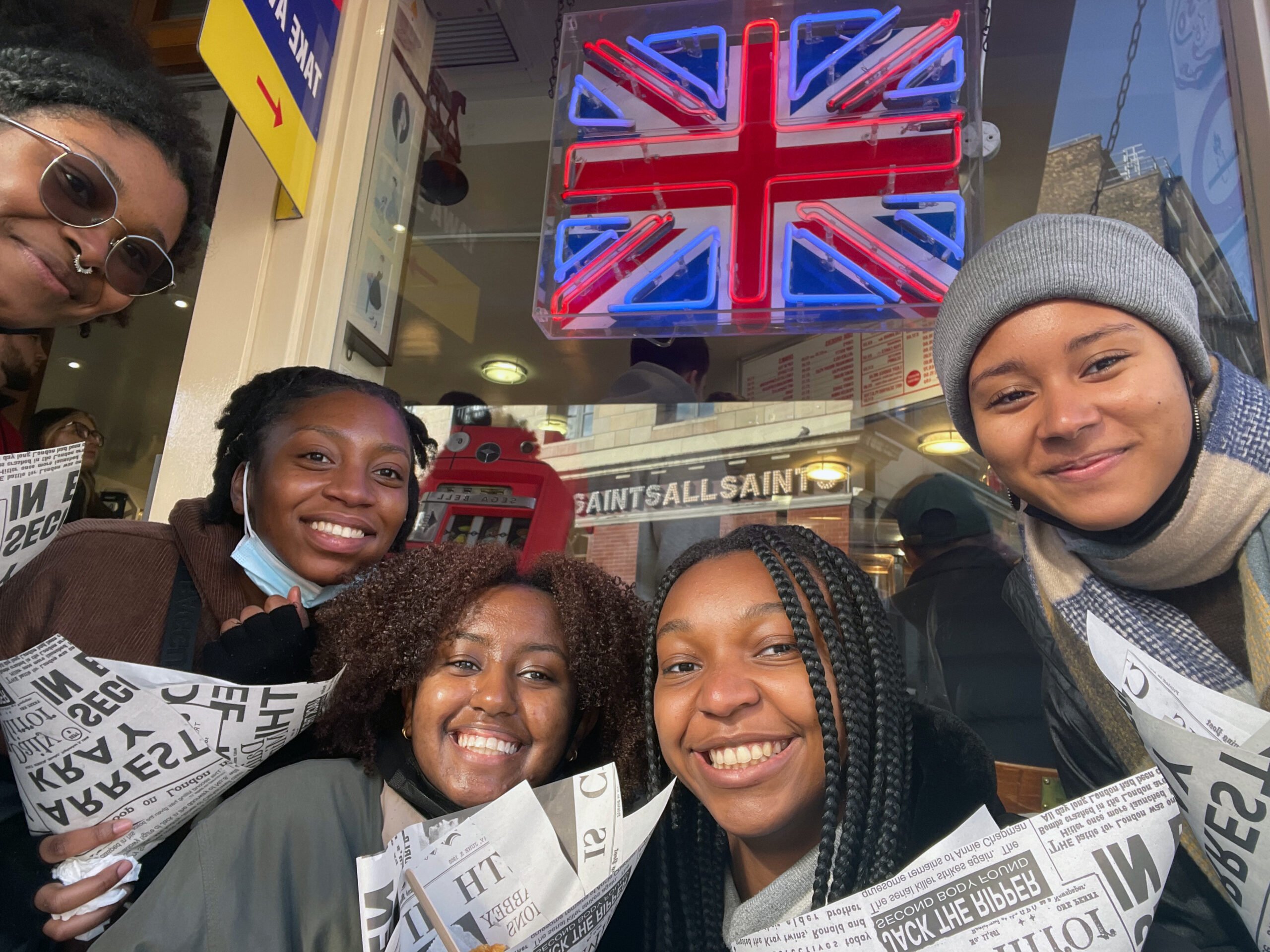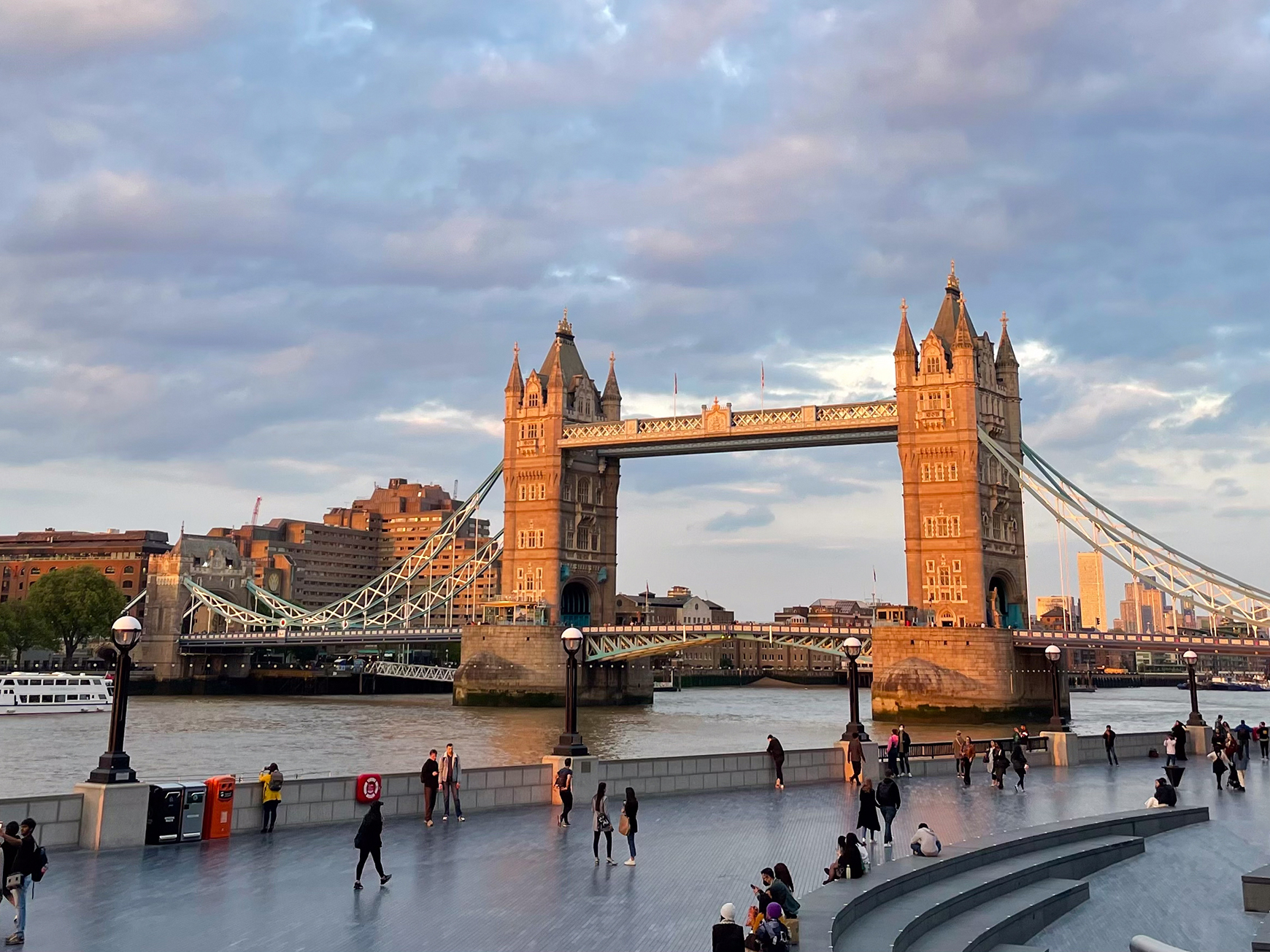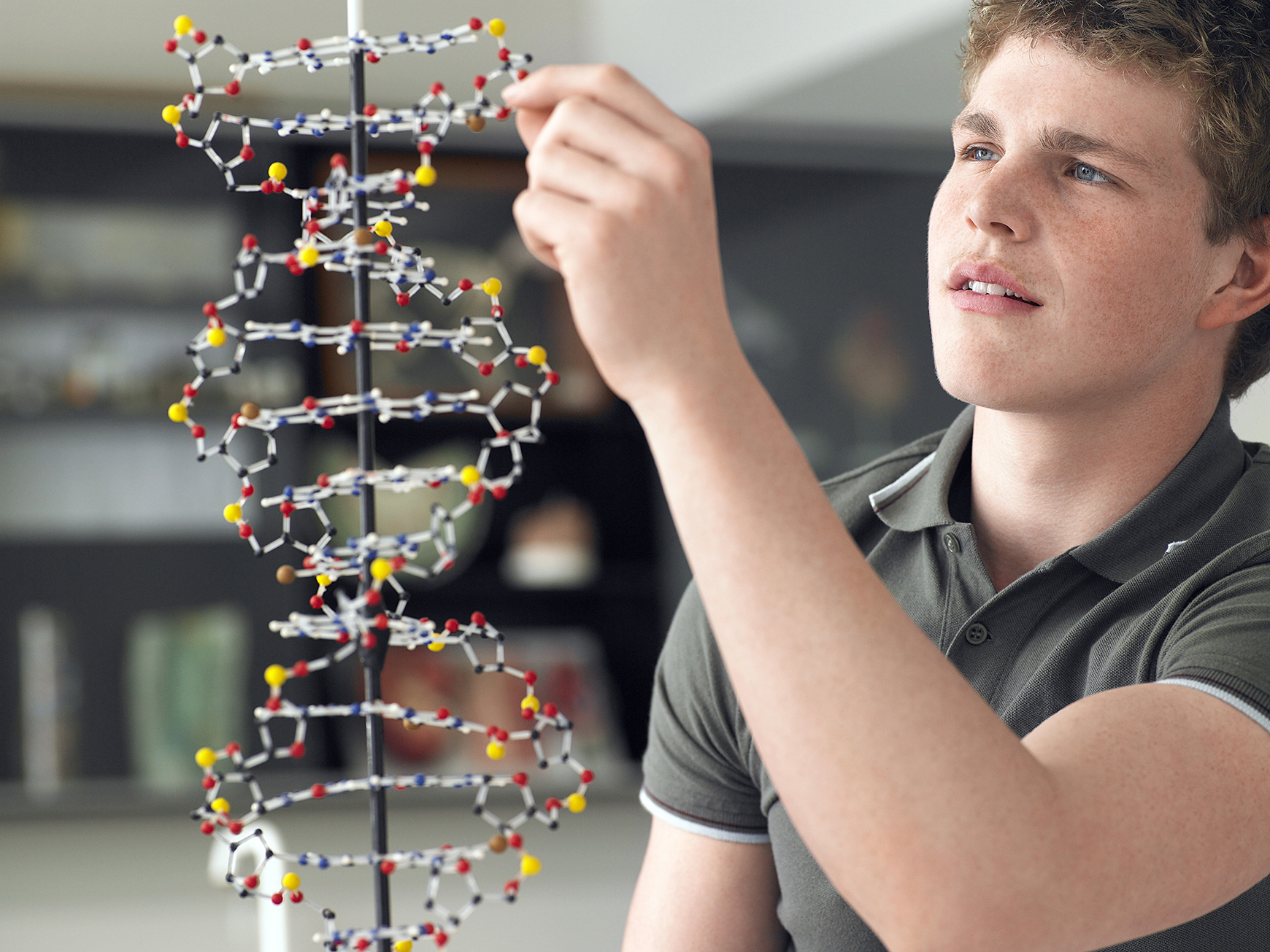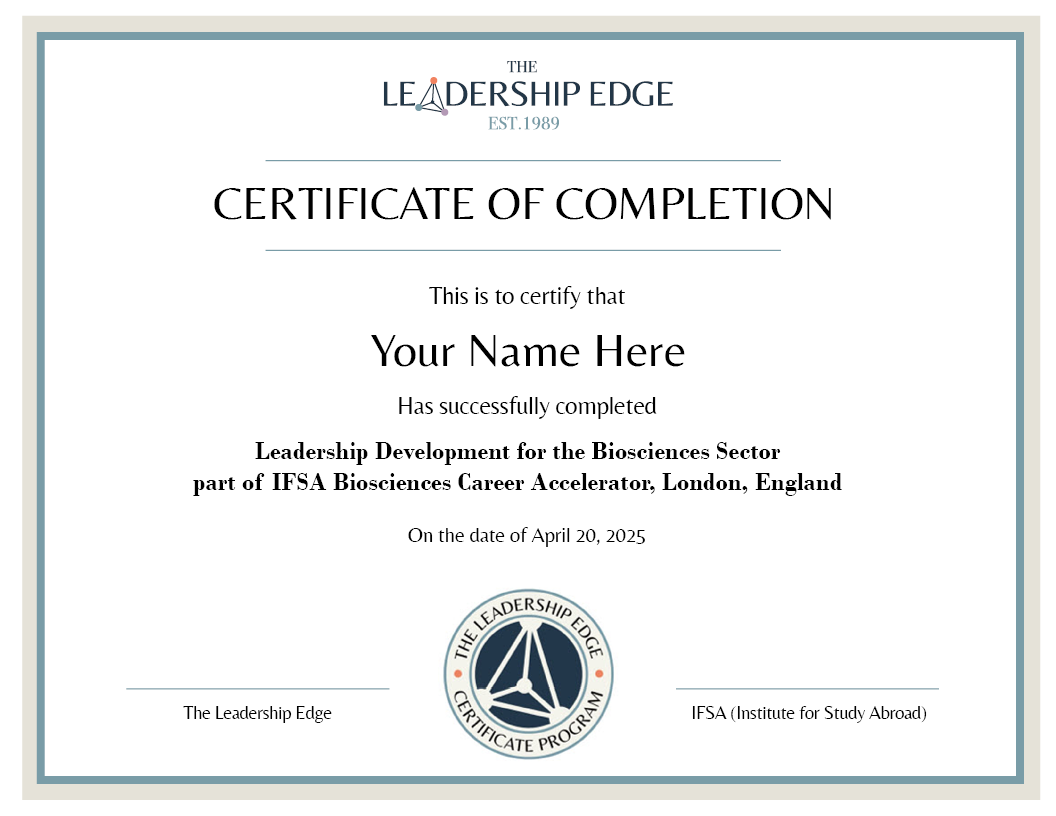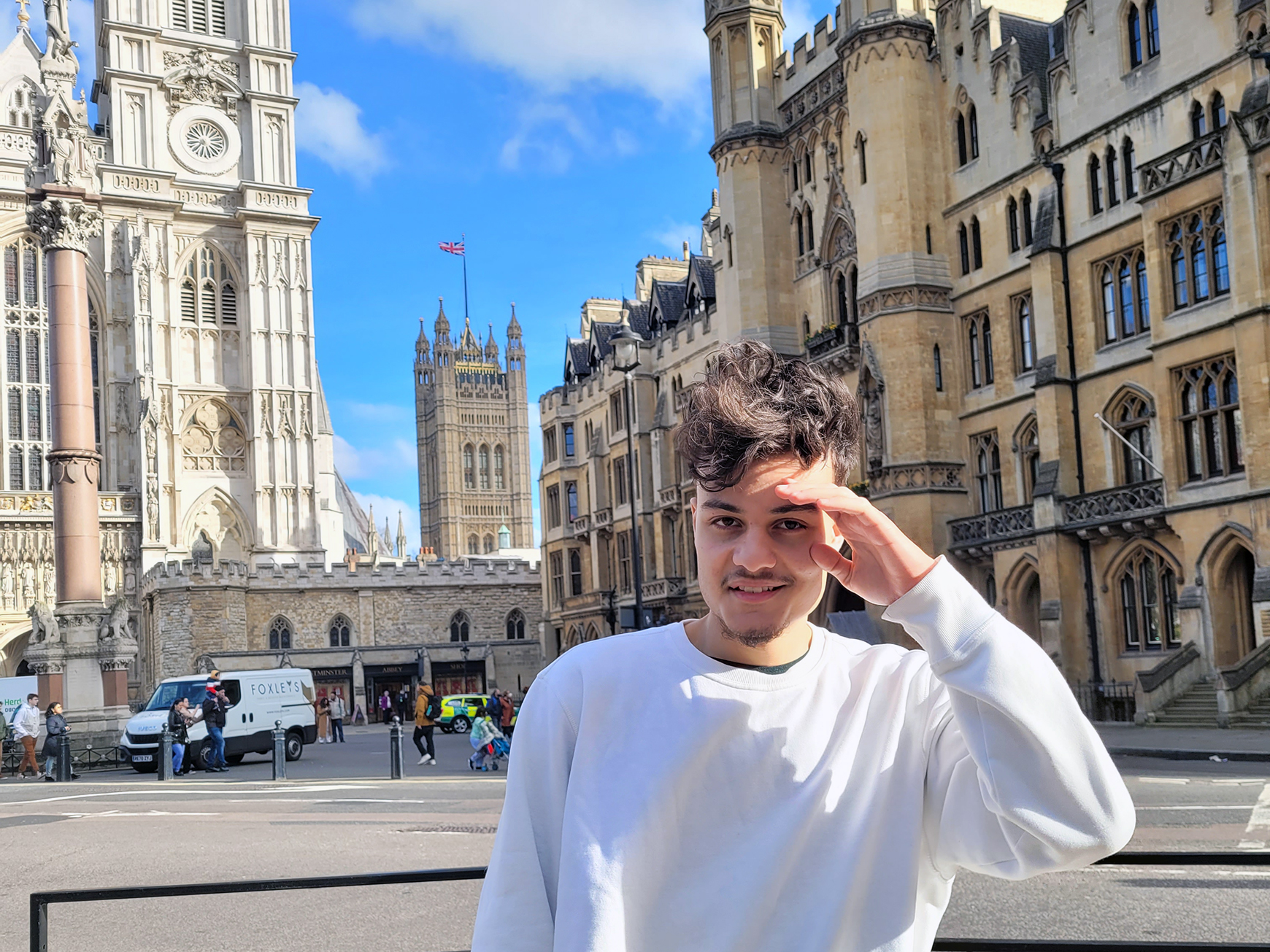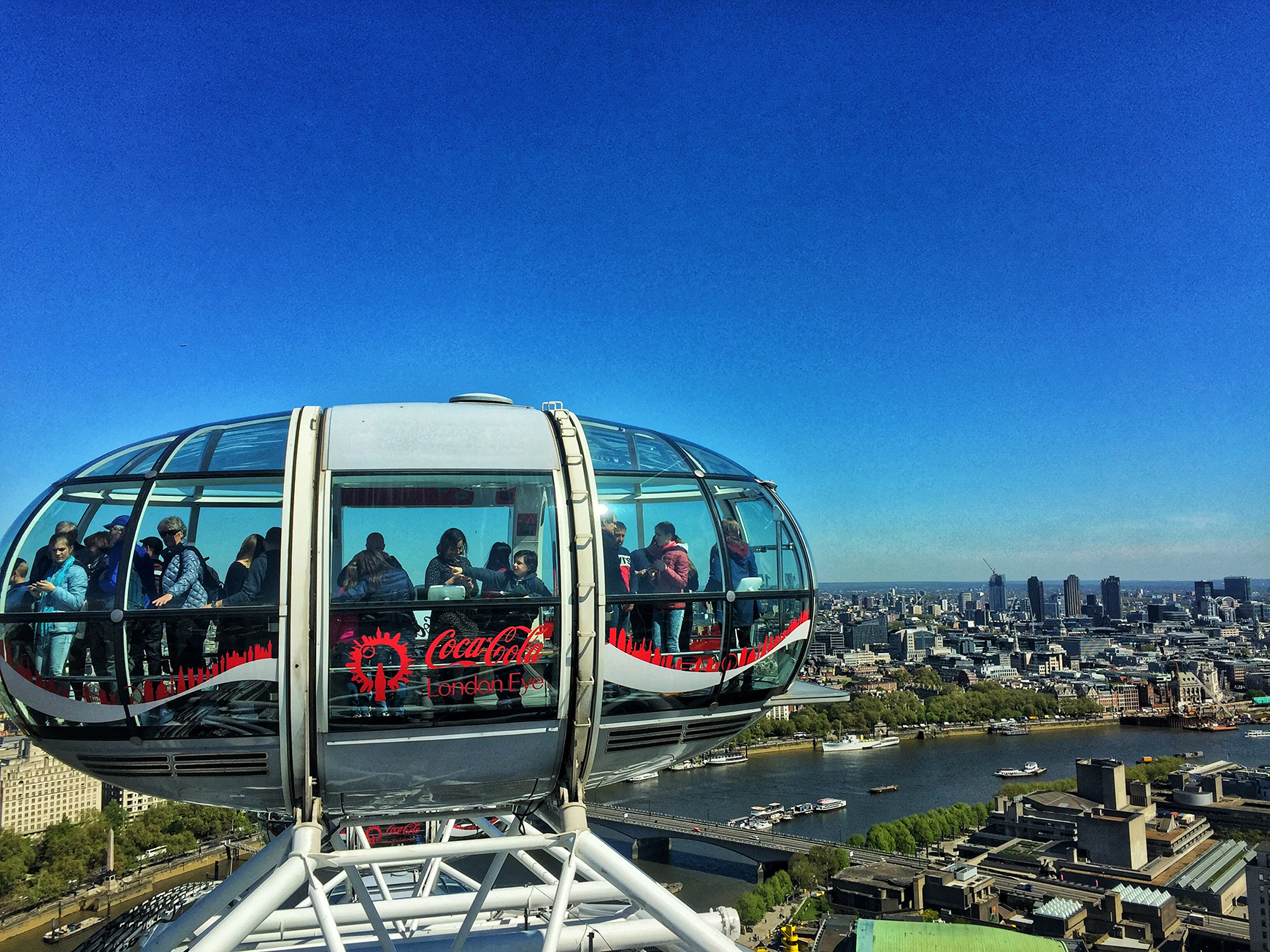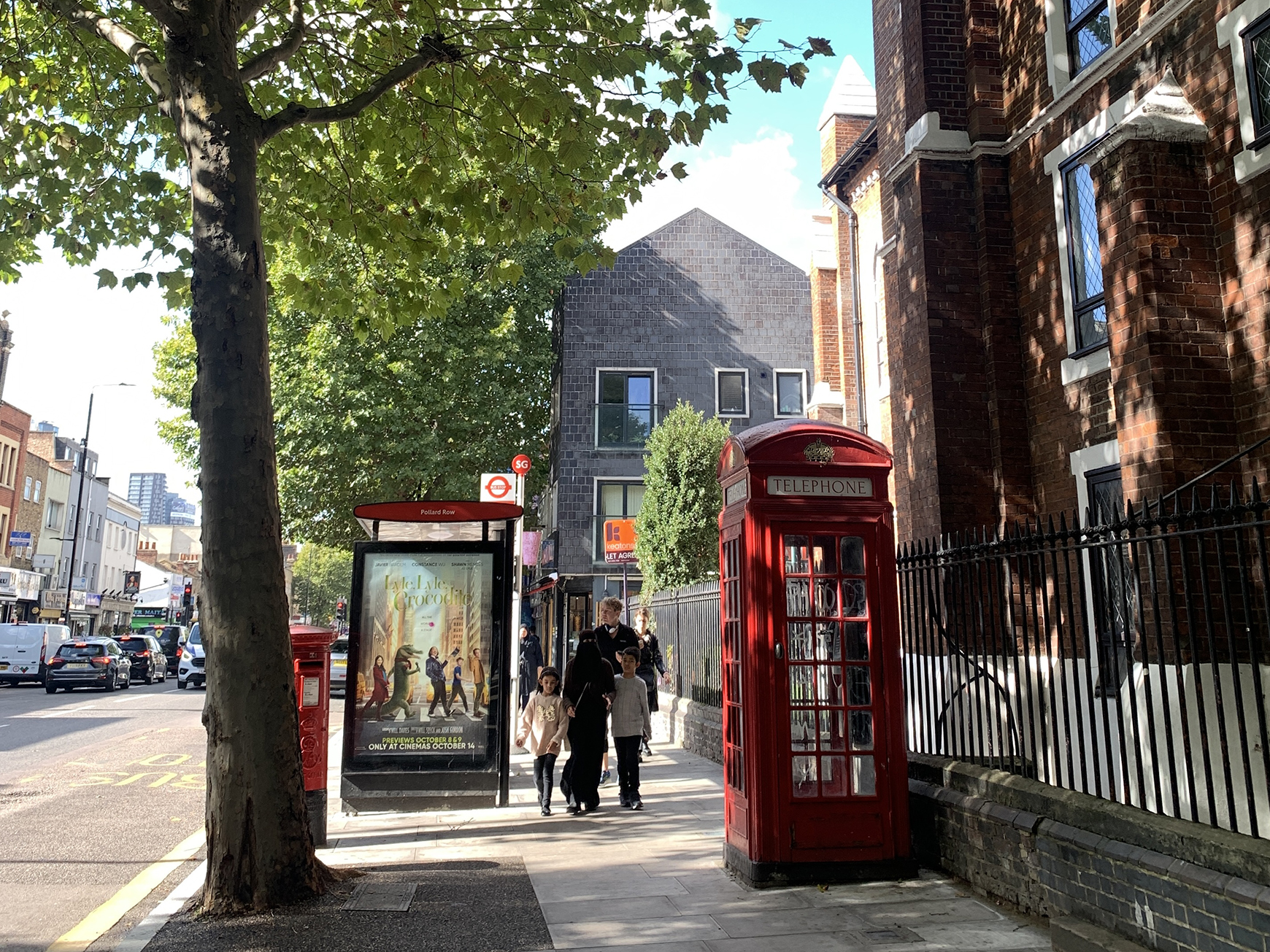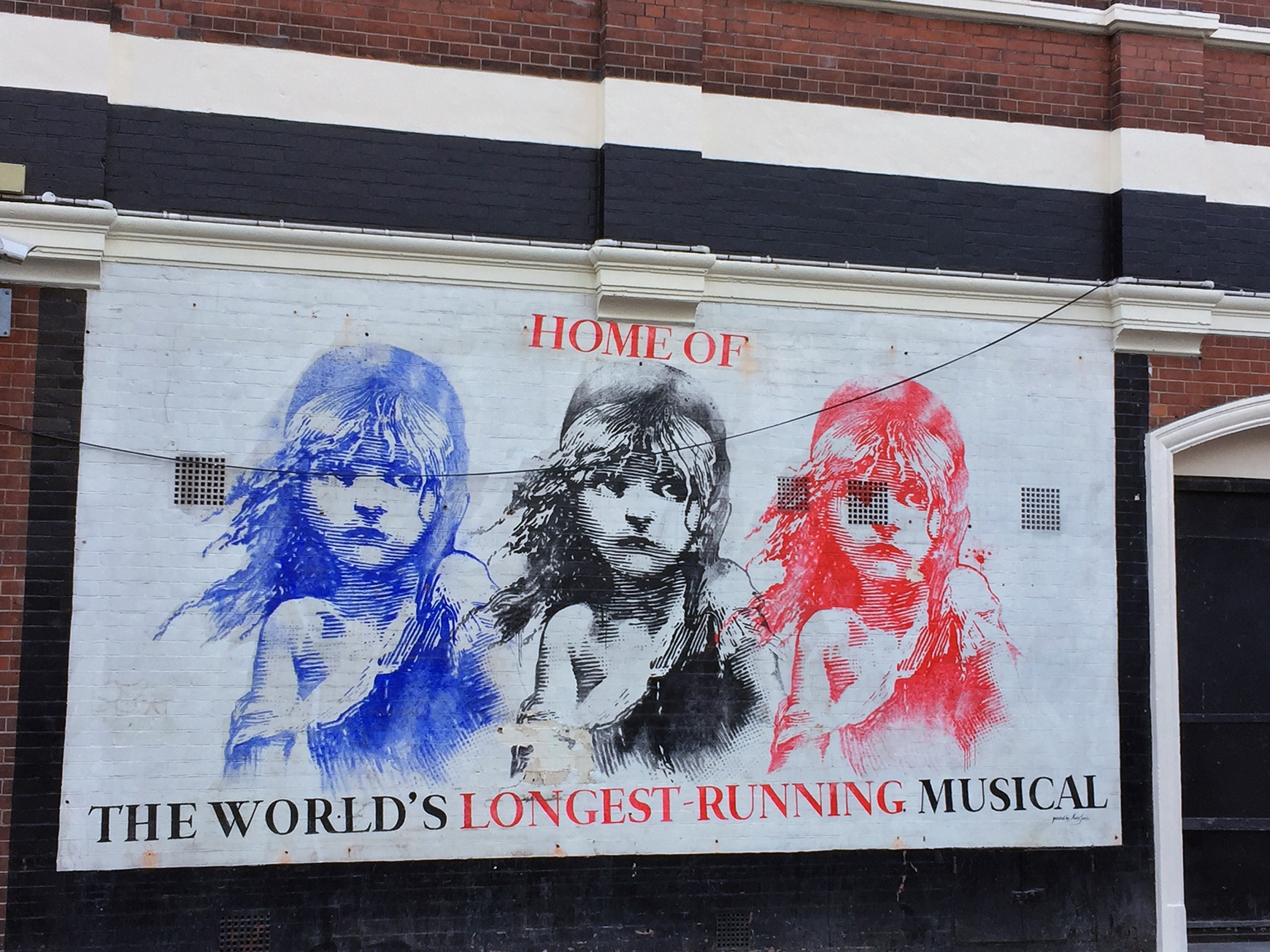London, England
IFSA Biosciences Career Accelerator


Program Overview
DESIGNED WITH LEADING U.S. UNIVERSITIES AND BIOSCIENCE PROFESSIONALS
Explore the possibilities for a bold future in this dynamic sector in the heart of London! With biology, neuroscience, public health, and more classes taught by IFSA plus the option to take a class at Queen Mary, University of London or the University of Westminster, it’s easy to stay on track in your major as you explore.
Meanwhile, see firsthand how the biosciences sector works and build professional skills with group challenge projects, company visits, and guest speakers.
Preparation for a global field
Science is a worldwide collaboration. That makes London—a city as diverse as it is sophisticated—the perfect location to build intercultural agility as you explore and articulate cultural differences. These skills are incredibly valuable to the multinational companies in this sector that draw professionals from every continent.
Location, location, location
London is the world’s 11th largest city for biosciences, with a thriving ecosystem that spans the entire sector, from biotech to nutraceuticals. It’s also the world’s top study-abroad destination. Get to know the city as you wander Camden Market, wonder at Tate Modern masterpieces, time travel at the Tower of London, and connect with local peers during special meetups, meals, and excursions.
HBCU students: Enroll in this program with a cohort of peers from HBCU schools for a groundbreaking study abroad experience, created to drive your successful career! Grants available. Learn more.
This is an exclusive IFSA-Designed Program. Learn more about these affordable programs here.
Details at a Glance
Application deadline
Minimum GPA
2.00
Credit load
12–17
Housing
Apartment/Flat, Single Room Option
Instruction language
English
Language prerequisites
None
Visa required?
Not in most cases. Learn more.
Academics
IFSA Biosciences Career Accelerator provides a compelling British Accreditation Council accredited curriculum focused on leadership in the biosciences sector and classes selected for U.S. degree requirements. Build your own curriculum with a combination of IFSA classes. All students take Leadership for the Biosciences Sector. Select IFSA elective classes for a total of 12–17 U.S. semester credit hours.
You may opt to take one or two electives at the University of Westminster or Queen Mary, University of London for a supplemental fee.
- Queen Mary: A leading UK, research-focused university. High-caliber academics, including strong business and science. Located in the historic East End district.
- Westminster: A full range of options from art to business, on four campuses. Known for its diverse student population.
CORE CLASS
Leadership Development for the Biosciences Sector (required)
Get ready to approach a fulfilling career in biosciences with insider’s knowledge and in-demand skills. From researchers to the range of team players that support their breakthroughs by managing projects, marketing, finance, and more, employers in this exciting sector seek talented candidates who can think critically, communicate, and collaborate effectively with a diverse group of teammates.
This unique class complements academic work, combining professional skill development with an in-depth look at how this industry operates, and delivering thoughtfully designed opportunities to put learning into practice. Lessons come to life with group projects, visits to industry companies and organizations, talks from experts who are driving industry change, and networking events—each enriched by immersion in London’s globally recognized bioscience ecosystem.
When you finish this class, you’ll have a complete understanding of career options that build on your love of science, as well as valuable global connections and a deeper understanding of your personal strengths. In addition, you will have an exclusive credential from The Leadership Edge—a firm that partners with 1,000+ life science companies, worldwide—to highlight your new abilities. (3 U.S. semester credit hours)
Watch these videos to see how this innovative class benefits you:
- What are employers looking for?
- Why is the Leadership Development class important?
- How does the Leadership Development class expand my career options?
- How will the Leadership Development class help me be successful?
- What skills will I learn? Why are they important?
- How does this class provide real-world experience?
- I’m not sure what career I want to pursue. How can this class benefit me?
- So many jobs center on tech skills. Why does communication matter?
- Skills like collaboration can help me land my first job. How can they help me later?
- What does this class add that I can’t get at my campus career center?
IFSA BIOSCIENCES ELECTIVE CLASSES
IFSA has carefully tailored a suite of bioscience classes to fit U.S. degree requirements. All classes are open to all students. Prerequisites for some classes may be required. Please note, not all classes may be offered in a given semester depending on enrollment. Click on each link below for a detailed class syllabus.
Biochemistry
This class focuses on studying chemical reactions at a molecular level to gain a deep understanding of living matter. Metabolic homeostasis, protein structure, and nutrient intakes impact on molecules will be covered. (3 U.S. semester credit hours)
Cognitive Neuroscience Foundations
This class will introduce the cognitive systems in neuroscience that include attention, pattern recognition, knowledge representation, language, reasoning, and human intelligence. (3 U.S. semester credit hours)
Ecology
This class will provide an overview of population biology, evolutionary ecology, community structure, with emphasis on species interactions, including competition, predation, and symbiosis. (3 U.S. semester credit hours)
Introduction to Statistics for Biosciences
This class will introduce the statistical methods used in the analysis of biological experiments. Topics covered in this class will include descriptive statistics, analysis of variance, regression, correlation, contingency analysis, and the testing of methods for sampling natural populations. (3 U.S. semester credit hours)
Microbiology
This class focuses on the different types of microorganisms, how they function, and research methods that can be applied to understand and manipulate them further. (3 U.S. semester credit hours)
Microbiome and the Brain
This class focuses on the microorganisms living within our body and how this plays a role in our health. This will include an overview of bacterial diversity and taxonomy, types and mechanisms of plant-bacteria interactions, bacterial pathogenesis, and methods for study. (3 U.S. semester credit hours)
Scientific Communication
In this class, students will develop skills in written and oral scientific communication. The class provides background on the different segments of scientific writing, including the peer review process and research communication. It requires students to write papers, abstracts, and grant proposals. Additionally, the class will provide context for copy editing, peer review and critique, and preparing presentations and proposals. (3 U.S. semester credit hours)
IFSA ELECTIVE CLASSES
All classes are open to all students. Prerequisites for some classes may be required. Please note, not all classes may be offered in a given semester depending on enrollment. Click on each link below for a detailed class syllabus.
Arts and Humanities
Directed Research
This class offers a unique opportunity for students to delve deeply into host context research projects. Students will be guided through projects that are both feasible in the study abroad context and relevant to their broader intellectual interests. The class is structured through regular individual meetings with a faculty mentor to discuss the formation and execution of a research plan and, depending on the specific project, the possibility to conduct field- or internet-based research. At the end of the semester, students present a formal research paper. (3 U.S. semester credit hours)
Fantasy in the Real World: Literature through the Sociological Lens
Fantasy literature has great power – but does it also have great responsibility? This course looks at mainstream and fringe fantasy literature from the past century and the power that it has in modern society at large. We will examine its creation, consumption, and its ability to impact the real world. Using works such as Harry Potter, His Dark Materials, The Lord of the Rings, and The Game of Thrones, as well as lesser-known writings, we will embrace the fantasy genre as a safe space to explore sociological topics that are difficult to clarify in the real world, such as race, gender, class, and political processes. (3 U.S. semester credit hours)
Intercultural Communications for the Global Workplace
Designed to help students communicate effectively with people from diverse cultural backgrounds, this course utilizes intercultural theory to explore the complexity of culture through paradox, stereotypes, verbal and non-verbal communication, personal beliefs and values, and strategies for building cultural intelligence and adaptability. Examination of U.K. work environments, professional practices, and business etiquette is an important and underpinning feature of the class. (3 U.S. semester credit hours)
Sustainability and the Global City
This class introduces urban sustainability from multiple disciplinary perspectives. It aims to provide students with the theoretical and methodological tools with which to evaluate potential for sustainable urbanism. Focusing on London alongside comparative global case studies, students will be exposed to urban planning and both natural and build environments in order to evaluate the common challenges and successes related to sustainability efforts. Through experiential learning opportunities, students will develop first-hand context as they examine various facets of sustainable urbanization in London. (3 U.S. semester credit hours)
New Media and Behavior
As individuals increasingly consume news from sources of personal choice and become producers of news through social media engagement, this class investigates communication patterns and human action. The relationship between media reporting and its impact on the psyche and decision-making provides a basis for course discussions. How does social networking affect our views of ourselves and others? How does our personal selectivity in news media consumption impact our choices and communications behavior? (3 U.S. semester credit hours)
Urban Identities: Gender, Race, and Class in London
Drawing from anthropology and sociology, this course utilizes intercultural learning theories to foster awareness of one’s own perspectives as well as those of the myriad communities that comprise London. Multiple approaches to framing the multicultural city and appreciating common and contested spaces as inherent to urban diversity are included. This course will examine the role, function, and effects of identity as it relates to the lived experiences of Londoners. While case studies examine gender, race, and class specifically, the course will approach identity from the perspective of intersectionality, in which the dimensions of diversity are understood as the simultaneous interplay of multiple factors. (3 U.S. semester credit hours)
Black History and Influence in the UK
Blacks in the British Royal Family and Aristocracy
This class delves into the rich and complex history of Black individuals in the British royal family and aristocracy, blending historical study with sociological analysis and pop culture exploration. Students will examine the presence and contributions of Black courtiers, nobles, and historical figures in British high society, while also exploring how contemporary media and culture reinterprets and represents these narratives. Through an interdisciplinary approach, the class will explore themes of race, class, identity, and representation in both historical and modern contexts, questioning how popular culture influences perceptions of British history and aristocracy. This class is ideal for students interested in history, sociology, race, media studies, and the interplay between historical fact and pop culture fiction. (3 U.S. semester credit hours)
Caribbean-British History, the Windrush Generation, and Modern-Day
This class offers an in-depth exploration of Caribbean-British history, focusing on the Windrush generation and the lasting impact of post-war migration on contemporary British society. Students will examine the social, political, and economic contributions of Afro-Caribbean immigrants to the UK, while also addressing the systemic challenges they faced. The class will cover themes of race, identity, and social justice, tracing the historical trajectory from the arrival of the Windrush generation to present-day issues such as immigration policy and racial inequality. Through an interdisciplinary lens, students will gain a comprehensive understanding of the complexities of Caribbean-British relations and the influence of this multi-ethnic cultural population on modern UK society. This class is ideal for students interested in history, sociology, politics, and social justice, with a focus on migration and race in the UK. (3 U.S. semester credit hours)
Clinical Trials Diversity and Patient Realities, U.S. vs. UK
This class provides an in-depth analysis of clinical trials in the U.S. and UK, focusing on the critical issue of diversity and its impact on patient outcomes. Students will explore how the inclusion (or exclusion) of diverse populations in clinical research affects the efficacy and safety of medical treatments. Through case studies, regulatory frameworks, and ethical considerations, the class examines the challenges and opportunities in designing trials that reflect the realities of diverse patient populations. Comparisons between the U.S. and UK healthcare systems will highlight differences in trial recruitment, regulatory policies, and health equity. (3 U.S. semester credit hours)
The Harlem Renaissance and Its Influence on 1920s UK
This history class explores the transatlantic impact of the Harlem Renaissance, a cultural, artistic, and intellectual movement that shaped African American identity in the 1920s, and its influence on the social, political, and artistic landscapes of the United Kingdom. Students will analyze how Harlem Renaissance ideas about race, art, and society resonated with British artists, intellectuals, and activists, as well as how this period fostered connections between African American and British thinkers. Through an interdisciplinary lens, this history class examines the intersections of history, sociology, the arts, and politics, highlighting the broader global significance of this cultural movement. This class is ideal for students interested in history, sociology, the arts, and political science within a global context. (3 U.S. semester credit hours)
Legacies of Empire in London
This class will use Tao Leigh Goffe’s Dark Laboratory: On Columbus, The Caribbean, and the Origins of the Climate Crisis as a keystone text to think about the ties between the historical origins of empire and capitalism, and the current climate crisis. In doing so we will investigate how archives, institutions, and cultural narratives in London, in the seat of empire itself, obscure the impacts of early globalization on the contemporary climate. Where Goffe investigates various Western countries’ impacts on the local areas of the Caribbean, we will look at where expansion to both the Caribbean and Asian locals and localities has come back to the heart of the British Empire, while also considering how we might “write back” to the seat of power. In doing so we explore the question: how might centering different histories and looking at how different institutions both are historically and contemporarily implicated, allow us to reimagine potential climate futures. (3 U.S. semester credit hours)
Business Classes
Business Ethics
This class delves into the core principles of ethics as they relate to the corporate landscape. Through a blend of theoretical exploration and practical case studies, students will examine the intricate ethical dilemmas faced by businesses and organizations. Emphasis will be placed on understanding the role of ethical leadership in fostering an environment conducive to ethical decision-making within the business realm. (3 U.S. semester credit hours)
Entrepreneurship: Creating a Plan of Action
Entrepreneurship is widely understood as engaging in a process to seek out or create opportunities for the purpose of starting a business; yet there is a gap between what entrepreneurs actually do to start a business and what some investors want prior to investing their money in entrepreneurs and their businesses. Therefore, the purpose of this class is to teach students how to do both: 1) think through and engage in the creation of a start-up and 2) develop and communicate a business plan to potential investors. In order to do the first, students will learn about and follow the “lean start-up” methodology, and to do the second, students will learn how to prepare a traditional business plan. (3 U.S. semester credit hours)
International Business
This class provides a comprehensive overview of international business strategies in the context of today’s globalized economy. Students will explore fundamental concepts and practical applications essential for success in the international marketplace. Topics include the analysis of globalization’s impact, the alignment and divergence of political and economic systems, international trade dynamics, foreign direct investment strategies, global finance and accounting principles, market entry strategies, global production processes, and challenges in international human resource management. Through case studies, discussions, and interactive exercises, students will develop a deeper understanding of the complexities of international business and gain practical skills for navigating the global business environment. (3 U.S. semester credit hours)
International Finance
This class delves into advanced concepts and strategies in international finance, offering students a deeper understanding of global financial markets and transactions. Topics include the analysis of exchange rate mechanisms, currency risk management strategies, international investment evaluation, multinational capital budgeting, and the complexities of international financial institutions. Through case studies, simulations, and hands-on projects, students will develop practical skills in navigating the intricacies of international finance and gain insights into the strategic decision-making processes of multinational corporations operating in the global marketplace. (3 U.S. semester credit hours)
International Marketing
This class explores the intricacies of international marketing, examining how businesses navigate diverse global markets and cultural landscapes. Students delve into market entry strategies, global branding, and cross-cultural consumer behavior, gaining insights into effective marketing campaigns tailored to international audiences. Through case studies and collaborative projects, students develop strategic marketing skills essential for success in the global marketplace. (3 U.S. semester credit hours)
Operations and Supply Chain Management
This class introduces business operation and supply chain management. Both operations and supply chain management are the primary functions of every company and organization. In this age of rapid globalization and fast-moving information, operations and supply chain management are the keys to improving company profitability and sustainability. It is crucial for the success of a company and its customers; therefore no one should underestimate its importance. Through lectures, case studies, and group discussion students explore the major topics in business operation as well as supply chain management. Students will not only learn the important subjects of operation and supply chain management, but also review actual case studies of leading global companies. The class is structured to cover the total value chain of operations and supply chain in this dynamic economic environment. (3 U.S. semester credit hours)
Principles of Negotiation
This class focuses on the skills and techniques of negotiation relevant to a wide range of contexts: from commercial communication to political debate, from public relations to social and public campaigns. Through class lectures and practical simulations, students will explore and compare theories of negotiation grounded in research from the fields of linguistics, psychology, and rhetoric. They will learn to apply a range of written and oral persuasive skills and devices effectively, and to manage a successful negotiation process in a multicultural environment. (3 U.S. semester credit hours)
Computer Science Classes
Algorithms
This class provides an introduction to the modern study of computer algorithms. It presents many algorithms and covers them in considerable depth through mathematical rigor and engineering issues. Through a presentation of algorithms in English and pseudocode, design techniques, and application areas this class will emphasize efficiency as a design criterion, we include careful analyses of the running times of all our algorithms. (3 U.S. semester credit hours)
Data Analysis
This class equips students with the essential skills and tools for extracting actionable insights from complex datasets. Through a combination of statistical analysis, data manipulation, and visualization techniques, students learn to uncover patterns, trends, and correlations within data. From exploratory data analysis to hypothesis testing and regression modeling, students gain proficiency in using data analysis to support evidence-based decision-making across various domains. (3 U.S. semester credit hours)
Introduction to Artificial Intelligence
The class will introduce the basics concepts which have developed in the area of Artificial Intelligence (AI). Since the 1960’s, AI has been applied to complex programs which could achieve tasks considered very complicated even for humans (such as optimization problems or face recognition). Today, AI has developed into a fully-fledged field which is connected with big data, data analytics, and machine learning. The class will introduce the key concepts of intelligent agents, their behavior and environment, and their role in problem solving, and knowledge and reasoning representation. Modeling intelligent behavior of the agents designed to solve problems is a challenging task, and several models have been developed (logical, probabilistic, and/or based on neural networks). The class will survey basic methods, looking for common points and differences. In particular, the modeling of learning (a characteristic trait of humans) will be discussed with examples from natural language processing, and will be put in the context of machine learning (ML). (4 U.S. semester credit hours)
Introduction to Machine Learning
The class provides an introduction to machine learning (ML), focusing on both solid and reliable theoretical foundations and ability to use its methods in practice. In the theoretical part, the focus is on understanding the variety of state-of-the-art ML models and algorithms. The models for ML range from geometrical, to probabilistic and logical. Students will learn how to distinguish these models and how to use them effectively. Several specific models and algorithms will be discussed, including regression, clustering, decision trees and neural networks, and deep learning. The applications of ML in data analytics will also be analyzed. Concurrently, students develop a solution for a test problem using tools discussed in the class, such as git, python, etc. The practical experience with ML algorithms is helpful in assessing the effectiveness of ML algorithms and provides an understanding of the key role of data selection and the evaluation of results. (3 U.S. semester credit hours)
Principles of Operating Systems
This class unveils the core principles that govern modern computing systems. Through engaging lectures and hands-on assignments, students will delve into system calls, memory management, process scheduling, concurrency, and more. The class culminates in a team-based operating system project, applying knowledge to real-world scenarios. By the end, students will understand operating systems’ functions, challenges, and their seamless interaction with hardware and software. (3 U.S. semester credit hours)
Programming Languages
This class unveils the core principles that govern modern computing systems. Through engaging lectures and hands-on assignments, students will delve into system calls, memory management, process scheduling, concurrency, and more. The class culminates in a team-based operating system project, applying knowledge to real-world scenarios. By the end, students will understand operating systems’ functions, challenges, and their seamless interaction with hardware and software. (3 U.S. semester credit hours)
Software Engineering
The class provides an introductory class in software engineering. The class surveys both the theoretical knowledge and practical skills needed to successfully execute a project in which a software solution is being developed. The focus will be on two dimensions essential for successful development: software engineering proper, which includes software architecture selection and other technical details, and project management, including its planning stage. The emphasis will be on modern methods for project planning and execution, with a focus on agile and scrum methodologies which have been increasingly used in the industry. Students will learn how to model software processes and analyze a client’s needs to design a suitable solution. Several methods will be discussed, and representations via UML (Unified Modeling Language) developed. The requirements for system architecture will be surveyed and suitability of different solutions analyzed. In the design stage, attention to object-oriented approach will be emphasized. Methods for testing and evaluation will be analyzed in the concluding stage of the project. The theoretical information will be accompanied with practical experience—students will develop a small-scale project which will allow them to track the specific stages of software engineering processes and appreciate their relative importance. (3 U.S. semester credit hours)
Statistics and Data Mining
This class examines the principles and methodologies of statistics and data mining, providing students with the tools to extract valuable insights from large and complex datasets. From descriptive statistics and inferential techniques to machine learning algorithms and clustering methods, students learn to analyze and interpret data to support decision-making and drive business outcomes. Through hands-on projects and case studies, students gain practical experience in applying statistical and data mining techniques to real-world datasets. (3 U.S. semester credit hours)
Tech, Ethics, and Public Policy: Innovation and Disruption
The class will explore the ethical and social impacts of technological innovation, integrating perspectives from a range of academic disciplines to examine the impact of technology on humans and societies. Students will be encouraged to consider their responsibilities as consumers and potential creators of new technologies and to think about their broader ethical and societal implications. This, in turn, will help students to explore and discuss the benefits and drawbacks of current and possible future policy interventions. (3 U.S. semester credit hours)
Health Science Classes
Comparative Health Systems
This class explores the diverse landscape of existing healthcare systems in different countries and critically evaluates their structures, policies, and outcomes. Through comparative analysis, students will examine the strengths and weaknesses of healthcare models and systems, including single-payer systems, socialized medicine, and market-based approaches. This class will encompass issues of access, quality, cost containment, and equity in healthcare delivery, providing valuable insights into global health policy and practice. (3 U.S. semester credit hours)
Economics of Healthcare
This class offers a comprehensive examination of the economic principles that underpin various healthcare systems, including socialized healthcare, private insurance markets, and hybrid models. Through theoretical analysis, case studies, and comparative evaluations, students explore the financing, delivery, and regulation of healthcare services in different contexts. Topics include the role of government intervention, mechanisms for healthcare financing and reimbursement, cost-effectiveness analysis, and the impact of economic factors on healthcare access, quality, and equity. Special attention is given to understanding the strengths and weaknesses of different healthcare systems, including social health care models, and their implications for healthcare outcomes, patient satisfaction, and overall societal wellbeing. By critically analyzing real-world examples and policy debates, students develop a nuanced understanding of the complex interplay between economics, politics, and healthcare delivery systems. (3 U.S. semester credit hours)
Introduction to Personal and Community Health
This introductory class provides a comprehensive exploration of key concepts, theories, and practices in personal and community health. Through an interdisciplinary lens, students examine the multifaceted determinants of health, including biological, psychological, social, environmental, and cultural factors. Topics covered include health promotion, disease prevention, lifestyle behaviors, healthcare access, and the social determinants of health disparities. Students will understand the impact of individual choices, community resources, and public policies on population health outcomes. Through interactive lectures, group discussions, and experiential learning activities, students explore strategies for promoting health and wellness at the individual, interpersonal, and community levels. Special emphasis is placed on addressing health inequities and advocating for health justice within diverse communities. By the end of the class, students develop critical thinking skills and practical tools to assess health risks, make informed decisions, and actively engage in efforts to improve personal and community wellbeing. (3 U.S. semester credit hours)
Introduction to Research in Community Health
This class examines the essential components of research in community health. Through theoretical and practical exploration, students delve into research design, methodologies, data collection, and analysis techniques relevant to community health studies. Emphasis is placed on ethical considerations, cultural sensitivity, and community engagement in the research process. Through hands-on projects and fieldwork, students develop the skills and knowledge necessary to conduct rigorous research that addresses pressing public health issues and informs evidence-based interventions. (3 U.S. semester credit hours)
Mental Health Psychology
This class explores the psychological dimensions of mental health and illness from a biopsychosocial lens. Class topics will include the classification of mental disorders, evidence-based treatments, and stigma reduction efforts. Through lectures, discussions, and experiential activities, students gain insight into the complexities of mental health issues and develop strategies for promoting psychological wellbeing in individuals and communities. (3 U.S. semester credit hours)
Public Speaking
This class covers the fundamentals of effective communication, including speech preparation, audience analysis, delivery techniques, and persuasive strategies. Students receive constructive feedback on their speaking skills and have opportunities to practice public speaking in various contexts relevant to health communication, such as presentations, debates, and advocacy campaigns. Upon completion of class, students will develop confidence and proficiency in public speaking through theory-based instruction and exercises. (3 U.S. semester credit hours)
Psychology Classes
The Psychology of Crime and Justice in the UK
This class will follow the historical evolution of forensic psychology from Jack the Ripper to Julian Assange. Is a criminal mind born as such, or is the criminal a product of their environment? What role do governments and societies play in facing crime? Students will gain a foundation in relevant areas of psychology and psychoanalysis and then examine how that science interacts with real-world judicial systems. Additional topics will include punishment, treatment, and rehabilitation; assessment and intervention; and how dimensions of privilege can impact perceptions of crime and justice in both conscious and subconscious ways. (3 U.S. semester credit hours)
Social Psychology
A comparison of familiar social settings with unfamiliar social norms and behaviors abroad, this class explores the basic theory and research of social psychology – studying the interaction between individuals and social groups and how the behavior of groups and individuals within them is mutually affected. Students will demonstrate and discuss the pillar concepts of social psychology, including conformity, conflict, persuasion, helping, perceptions, and social identity. Students will expand on the roots of feelings, beliefs, attitudes, and behavior locally and globally and explore your own attitudes and identity. (3 U.S. semester credit hours)
CHART Your Course
Find the classes you need fast with CHART. Our easy-to-use tool shows you classes recently taken by IFSA students.
DIRECT-ENROLL CLASSES
Engage with other local and international studies and gain the experience of studying on a London campus by taking one or two electives, including lab classes, at one of our local partners. Classes are available at the University of Westminster or Queen Mary, University of London for a supplemental fee.
UNIVERSITY OF WESTMINSTER DIRECT-ENROLL CLASSES
Westminster requires a 2.6 GPA minimum for enrollment in its classes. Media, arts and design classes (“MAD” classes) require a cumulative 2.7 GPA. The communication, design, and media classes are extremely competitive and can close before the IFSA published deadline.
Classes
Visit the University of Westminster class catalog to see a list of available subjects.
- Study abroad students may enroll in level 4, 5, and 6 classes. Levels often correspond with academic years.
- First-year (Level 4) classes are appropriate for departments in which you have little or no prior experience.
- Second-year (Level 5) classes will be equivalent to advanced sophomore or junior-level U.S. classes.
- Third-year (Level 6) classes are only available to students with a major in the area of study and two prior years of study in the subject area.
- Study abroad students are not eligible for fourth-year (Level 7) classes.
Credit Conversion
10 CATS/UK Points = 3 U.S. semester credit hours
15 CATS/UK Points = 4 U.S. semester credit hours
20 CATS/UK Points = 5 U.S. semester credit hours
QUEEN MARY, UNIVERSITY OF LONDON DIRECT-ENROLL CLASSES
Queen Mary requires a 3.0 GPA minimum for enrollment.
Fall Classes
You have access to any class available to visiting students. To view available classes at Queen Mary, visit the university’s class catalog.
- Be sure to filter by Associate student modules, as these are available to visiting students.
- Study abroad students may reroll in level 4, 5, and 6 classes. Levels often correspond with academic years.
- Level 4 is an introductory university-level module.
- Level 5 is an intermediate university-level module
- Level 6 is an advanced university-level module.
Students who enroll in fall term modules within the School of Economics and Finance or the School of Biological and Behavioral Sciences will complete final assessments online in January. Queen Mary does not allow alternate arrangements to be made for either full degree or study abroad students, including IFSA students.
Spring Classes
Students enrolled in the spring term will complete on-site class instruction in late April. Final assessment, papers, and/or projects will be completed upon returning home and by the end of the regular Queen Mary spring term. Available classes may change from spring term to spring term. Reach out to your IFSA Enrollment Counselor for more information and assistance in locating classes.
Credit Conversion
10 CATS/UK Points = 3 U.S. semester credit hours
15 CATS/UK Points = 4 U.S. semester credit hours
20 CATS/UK Points = 5 U.S. semester credit hours
30 CATS/UK Points = 8 U.S. semester credit hours
Lab & Field Trip Fees
Please review syllabi and course materials when registering for direct-enroll classes. Certain classes may have a one-off lab or field trip fee disclosed in the syllabus or during the first meeting of the class. These fees are not included in your IFSA program fee. You will be responsible for these fees, whether they are billed and paid by IFSA or billed to you.
BAC ACCREDITED CLASSES
All IFSA-taught classes in the UK are accredited by the British Accreditation Council.
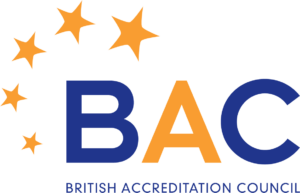
UNIVERSITY OF WESTMINSTER
Prerequisites
- The University of Westminster requires a 2.6 GPA minimum for enrollment in its classes. The University of Westminster will consider applicants with a GPA from 2.60-2.69 with additional application materials.
- Media, Arts and Design classes (“MAD” classes) require a cumulative 2.7 GPA.
Restrictions
Internships are not available to IFSA students on this program.
QUEEN MARY, UNIVERITY OF LONDON
Prerequisites
- Queen Mary requires a 3.0 GPA minimum for enrollment in its classes.
- Class prerequisites as stated in syllabi.
- Students enrolling in a Spring term class at Queen Mary must ensure the selected class allows them to complete on-site class instruction by late April and that any assessments are completed by late April or can be completed remotely.
Restrictions
Level 6 Advanced/honors classes will be equivalent to senior-level U.S. classes. These are often not available to study abroad students.
School of Drama
Associate students selecting DRA modules at levels 5 and 6 must have experience of related subjects in the arts and humanities at university level. Classes have limited availability. If you are planning to take classes in this school, please return your class interest form as soon as possible.
School of Economics and Finance
School of Economics and Finance restrict all level 5 and 6 modules to students with Economics and Finance majors only. A mathematics prerequisite (equivalent of A-level maths, including calculus) is required for level 4 ECN modules.
School of Electronic Engineering and Computer Science
Students choose from a limited set of computer sciences classes. Limited spots are available for study abroad students, and priority will be given to students majoring in these disciplines. Queen Mary offers SPZ401 Applied Data Science, developed outside the School of Electronic Engineering and Computer Science to avoid restrictions and enrollment caps, with study abroad student in mind. For fall semester classes that are assessed via a final exam, please note that exams will take place online in January of the following year.
School of English
School of English welcomes all students to Level 4 modules, but restrict all level 5 and 6 modules to students with English or Arts/Humanities majors only. Classes have limited availability. If you are planning to take classes in this school, please return your class interest form as soon as possible.
Department of Psychology
Students may choose from a limited set of psychology classes offered specifically to study abroad students (Fall term: Cognitive Psychology and Health Psychology; Spring term: Psychology of Emotion and Psychology of Individual Differences). The Department of Psychology does not allow study abroad students to enroll directly in psychology classes alongside degree-seeking students.
The class catalog will indicate any other classes not open to study abroad students with “not open to associate students” in the class description.
DIRECTED RESEARCH
Engage in individualized field research with faculty experts on a contemporary issue of interest. Regular meetings with faculty will assist in the formation and execution of research plans, and they will guide you on how to thoughtfully and critically integrate academic research with experiential learning. You will sharpen your written and oral communication skills through the development of articulate and comprehensive research that is respectful to the sensitivities of the local culture.
If you chose to research live human subjects, live animals or another topic that is deemed by IFSA to be required to be reviewed by the Institutional Research Board (IRB) at your home institution, then you will have to file your project with your home institution’s IRB board and submit your result to IFSA. Your IFSA Enrollment Counselor will review your application materials to help determine if you must file with IRB.
For more detailed information and examples of previous student placements, contact your IFSA Enrollment Counselor.
New country, new way of learning!
Here’s what to expect at Queen Mary, University of London:
- More emphasis on independent learning. The university recommends completing 10 hours of independent study for each academic credit you seek.
- More advanced instruction and work than you’d find in a class at the same level in the United States. Because most English university degrees are three-year programs, students gain specialized knowledge faster here.
- Less personal access to professors. Instead, it’s common to connect with more junior faculty members.
- Grades are often based on a single final exam or final paper, or on just a few assignments.
- Choose classes from one department to avoid scheduling conflicts. Local students usually specialize in one department for classes, which means different departments don’t schedule classes with other departments in mind.
- Full access to the university’s robust academic support system and resources, including an assigned advisor for academic support. IFSA local staff are also available for individual help.
APPLICATION REQUIREMENTS
Eligibility
- You must be at least 18 years of age. Students under 18 may be accepted on a case-by-case basis.
- You must be currently attending or recently graduated from a U.S. or Canadian community college, technical college, two-year college, four-year college, or four-year university.
- You must have completed at least one (1) full-time semester of study at your home institution before the beginning of the term.
- Eligibility requirements can vary among host institutions. Please ask your IFSA Enrollment Counselor for specific information.
IFSA Classes
- GPA: 2.0
- Fall Term Application Date: April 15
- Spring Term Application Date: Oct. 15
- Letter of Recommendation: Not required
Queen Mary, University of London Classes
- GPA Requirement: 3.0
- Fall Term Application Date: April 15
- Spring Term Application Date: Oct. 1
- Letter of Recommendation: One (1) academic letter of recommendation. A directed research site may request a reference letter before placement is finalized.
University of Westminster Classes
- GPA Requirement: 2.6. The University of Westminster will consider applicants with a GPA from 2.60-2.69 with additional application materials. Media, Arts and Design classes (“MAD” classes) require a cumulative 2.7 GPA.
- Fall Term Application Date: April 1.
- Spring Term Application Date: Oct. 1.
- Letter of Recommendation: Not required.
TRANSCRIPT
Upon completion of your program, IFSA will send an official Butler University transcript to your home university with your coursework converted to the U.S. semester credit hour system. You will also have access to an unofficial transcript in your IFSA Student Portal. The transcript reflects classes taken, credits attempted, and grades earned during your term abroad. This service is included in your study abroad program at no additional cost. See our Transcripts page for more information.
Excursions
Activities and excursions are designed to pull you into the communities you visit and encourage cultural connections of every kind. There’s no extra fee to participate in these optional outings—everything is included in your program fee.
Below are a selection of activities and excursions from previous terms; options may vary for your program. Due to the seasonal nature of many of program activities, we cannot guarantee a specific activity or excursion will be available in a given term or program.
Activities
- The Great British Bake Off Experience: Step into the famous white tent and don your apron for this immersive baking experience. Perfect for fans of The Great British Bake Off, you’ll work in pairs and bake a dessert against the clock that will be judged by the head baker. You’ll even be able to take home your creation at the end!
- West End Theatre Performance: No time in the UK would be complete without a trip to the West End, London’s famous theatre district. Shows are chosen that provide context or different perspectives on London/the UK/Europe. Recent examples include Operation Mincemeat and Cabaret.
- Sustainability Garden: Visit a community garden started to rewild urban space and respond to the challenges of urban sustainable food production in line with the United Nation’s Sustainable Development Goals. By speaking to gardeners, learn more about the impact of sustainable practices on the biodiversity of urban areas and how they’re trying to widen participation in their local community. Make sure to dress appropriately because we’ll be getting our hands dirty!
Excursions
- Stonehenge and Bath Visit: Stonehenge has stood on Salisbury Plain for around 5,000 years and it’s still unknown how the prehistoric monument came to rest there! Make up your own mind during this visit and discover the fascinating theories behind these rocks. You’ll learn about Stonehenge from the fascinating exhibits and be able to enjoy a virtual sunrise as it rises over the prehistoric stones! Afterward, travel to the Roman city of Bath for a walking tour of this World Heritage city once home to Jane Austen, Charles Dickens, Gainsborough, Lord Nelson, and Beau Nash. Then prepare to travel back 2,000 years to the Roman era with a visit to the Roman Baths.
- Piers and Queers Brighton Trip: Since the 18th century, Brighton has become a cosmopolitan place of recreation, escape, and freedom. A destination for people who didn’t conform. With an LGBTQ+ population now estimated at 15%, Brighton celebrated England’s first civil partnerships, and hosts the UK’s largest Pride event as well as Europe’s first Trans Pride, rightly earning its title as the LGBTQ+ Capital of Britain. Piers and Queers is a tour of Brighton from LGBTQ+ perspective. This colorful 90-minute walk along the beach and historic city center takes in more than 200 years of history including Regency Dandies, 1950s lesbian and gay life, and political activism. Afterward, there’s time for a walk on the pier and fish and chips, just watch out for seagulls!
- Big Welsh Weekend: Delve into the rich history of Wales and explore its unique culture and its complex relationship with the rest of the UK on a weekend that takes in the famous Tintern Abbey, the historic Raglan Castle, the Blaenavon coal mines, and St Fagan’s, a museum that has preserved buildings and cultural practices from Welsh history. Spend the night in Cardiff, the Welsh capital, and discover the Cardiff Bay area, home of the Welsh Parliament.
- Yorkshire Adventure: Explore the vibrant and historic county of Yorkshire on a weekend trip where you’ll discover how this English region has contributed to the UK’s cultural landscape. Highlights may include the Bronte Parsonage in Haworth, the Piece Hall in Halifax, the Victorian model village of Saltaire, or the imposing Harewood House in Leeds.
Housing and Meals
Housing
Apartment/Flat, Single Room OptionMeals
Self-CateringDetails
Students live in furnished flats (apartments) selected by IFSA, with IFSA students as flatmates.
- Living space: Each flat contains single bedrooms, each with its own private bathroom.
- Bedrooms include bed, desk, chair, wardrobe, and light for each student.
- Comfortable space to cook, eat, socialize, and study either in your flat or in convenient common areas.
- Linens, except towels, are typically provided.
- Meals: There is no meal plan. Students cook or purchase their own meals. Some flats have private kitchens, others include shared kitchens. Most are fully equipped; if not, kitchenware is easy to purchase nearby. Flatmates say cooking and eating together is a fun, social part of their day.
- Commute: Varies by location. Expect a 40- to 50-minute trip via local train services, the Tube (the London subway), or bus.
Sample housing
Explore Vita Lewisham, one housing option, to see what your London home might be like:
- Location: Lewisham, an area in southeast London undergoing substantial regeneration, particularly following its tenure as London Borough of Culture in 2022. Lewisham Shopping Centre, a five-minute walk away, is home to over 70 stores. Across the street is Glass Mill Leisure Centre, with gym, pool, sauna, and steam room. Two-minute walk to Lewisham train station.
- Commute: 40 minutes by train/Tube to the IFSA Program Center in Mayfair. 40 minutes by Docklands Light Railway/foot to Queen Mary, University of London.
- Single rooms: Rooms include one double bed, desk, chair, wardrobe, and TV. Bed linens provided. Studio rooms include private kitchen with oven, stove, refrigerator, and microwave. Other rooms are part of cluster flats: six single rooms with private bathrooms, a shared kitchen, and living space. Kitchenware provided.
- Meals: No meal plan. Students purchase meals or prepare food in shared kitchens. Breakfast available in the reception area on weekday mornings. Free coffee 24/7.
- Common spaces: Three private dining rooms, a bar, study spaces, a gym with dance studio, and a games room.
- Other details: Unlimited Wi-Fi, staff and security on site 24/7. Laundry facilities on-site. Cleaning provided every two weeks. The residence runs a full social calendar.
- Nearby: The bustling Greenwich area, home to Greenwich Market, renowned museums, and Greenwich Park (where the Eastern and Western Hemispheres meet)—five minutes away via Docklands Light Railway. (Watch for celebrities: Greenwich frequently stands in as London and occasionally Paris in film and television productions.) Central London is 15 minutes away via train, so it’s easy to get to London Bridge and Charing Cross, the historic center of London.
Dates and Fees
Get Started

Kevin Cañas
Enrollment Counselor
